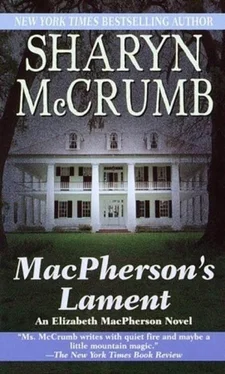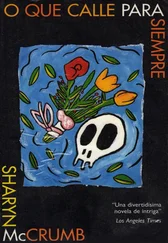Sharyn McCrumb - MacPherson's Lament
Здесь есть возможность читать онлайн «Sharyn McCrumb - MacPherson's Lament» весь текст электронной книги совершенно бесплатно (целиком полную версию без сокращений). В некоторых случаях можно слушать аудио, скачать через торрент в формате fb2 и присутствует краткое содержание. Жанр: Детектив, на английском языке. Описание произведения, (предисловие) а так же отзывы посетителей доступны на портале библиотеки ЛибКат.
- Название:MacPherson's Lament
- Автор:
- Жанр:
- Год:неизвестен
- ISBN:нет данных
- Рейтинг книги:3 / 5. Голосов: 1
-
Избранное:Добавить в избранное
- Отзывы:
-
Ваша оценка:
- 60
- 1
- 2
- 3
- 4
- 5
MacPherson's Lament: краткое содержание, описание и аннотация
Предлагаем к чтению аннотацию, описание, краткое содержание или предисловие (зависит от того, что написал сам автор книги «MacPherson's Lament»). Если вы не нашли необходимую информацию о книге — напишите в комментариях, мы постараемся отыскать её.
MacPherson's Lament — читать онлайн бесплатно полную книгу (весь текст) целиком
Ниже представлен текст книги, разбитый по страницам. Система сохранения места последней прочитанной страницы, позволяет с удобством читать онлайн бесплатно книгу «MacPherson's Lament», без необходимости каждый раз заново искать на чём Вы остановились. Поставьте закладку, и сможете в любой момент перейти на страницу, на которой закончили чтение.
Интервал:
Закладка:
Near the Maryland border I cross Antietam Creek, and the chills start. Antietam … I know that there are streets in Maryland named that now, probably grade schools and dry cleaners even. But to me Antietam is bodies piled in a roadway, one on top of the other, making a mound twelve feet high, stretching on and on through the dust of that winding road. It is the stench of powder and blood and death that can’t still linger after a hundred years and more, but still I smell it.
They are just words on road signs, that’s all, I tell myself. And between Norfolk and Richmond, on I-64, is an exit sign for Cold Harbor. Cold Harbor … The swampy terrain made it almost impossible to attack the well-entrenched Confederate Army. To charge in such a marsh against the enemy’s guns was suicide, and the Union soldiers knew it. Cold Harbor. On the shirts of their uniforms, they pinned pieces of paper bearing their names and their hometowns. That way when their bodies were pulled out of the swamp, they could be sent home for burial. One soldier wrote: June 3, 1864. I was killed.
I go out of my way not to drive past Cold Harbor.
In the South we haven’t really forgotten the War. Many of us knew people who knew people who fought in it. It hasn’t quite passed into history yet. It’s still more feelings than facts, and likely to remain so for a good while. I know this because I’ve been with my Scottish husband to an older battlefield-Culloden Moor, west of Inverness-and watched his face grow pale and solemn as he looked at the field where his kinsmen died. On that field, the Scots met death, defeat, and the end of their country as an independent nation. That was 1746, and it still stirs them, so I figure we have a ways to go before the emotion fades away, before words like Antietam and Cold Harbor pass without raising chills and dark memories.
I hadn’t thought about the War in a long time. It was Bill and his damned Confederate ladies who brought it all back. Even on I-95, where the most ominous sign is an ad for Gatorland, the gray ghosts rode along, making me remember them. In Virginia, the Civil War isn’t something you learn in school; it’s a Presence. Always there. I can remember an ancient great-aunt telling Bill and me about our great-great-grandfather David MacPherson, a sixteen-year-old private in the 68th Infantry under General Bragg. In 1865 the 68th had marched from Virginia to Fort Fisher in the snow, he’d told her. They had no shoes by that time, just shreds of leather or rags wrapped around cracked and callused feet. It was winter and they followed the railroad tracks south. They left bloody footprints in the snow.
That’s the war to me: a starving sixteen-year-old leaving footprints in the snow in his own blood. And the women I was tracking were the daughters of those young soldiers-the last link with them. So what was I supposed to do? Coax those old ladies into a nursing home so the state could take their house?
I wished there was something to look at on I-95 besides a million damned pine trees. I didn’t want to have to think anymore.
A month in a county jail had not improved Tug Mosier in any way. The lack of sunlight and starchy jail food had made him even paler and more flabby. His hair shone with grease, and a stubble of beard completed a look that would have made a jury convict him on general principles. He looked guilty of something. A. P. Hill managed to smile at her scruffy client, hoping that she looked more confident than she felt. At least she had a shred of a defense now.
“How’s it going?” she asked.
“I hate being cooped up,” said Tug. “Specially in summertime. And I sure as hell could use a drink.”
“I can’t help you there, but I do have some news about your case. First of all, I just had a meeting with the district attorney. He has offered you a deal, which is really beside the point because I have a new lead that may win this case for us.”
“The D.A. is talking a deal?” The scowl left Tug’s face and he leaned forward with the first sign of genuine interest he had shown since she arrived.
“Yes. He wants you to plead guilty to second-degree murder. He says he’ll ask for a ten-year sentence.”
“Yeah, but you don’t serve all the time they give you.”
“Well, you could, of course, if you tried to escape or didn’t behave. But usually a prison term is about a quarter of the sentence. Say two and a half years. That’s a long time to be behind bars, I’m sure. But listen: I have great news. I had a forensic expert study the autopsy report on Misti and she came up with a wonderful piece of evidence to help our case.”
Powell’s voice bubbled with enthusiasm as she explained Elizabeth’s theory about the absence of petechial hemorrhaging in Misti Hale. She had to repeat the part about low blood pressure-and still Tug looked unimpressed. “You see,” she said triumphantly, “if she died of shock, you didn’t kill her intentionally!”
Tug Mosier frowned and rubbed his stubble of beard. “You think a Patrick County jury is going to follow that?” he asked.
“I’ll call in a medical expert,” A.P. assured him. “We’ll go over the whole process. Maybe even have a chart to help the jurors focus on the technical part.”
“But if we do that, the district attorney won’t be going for second degree, will he? He’ll try to convict me of first-degree homicide. Maybe capital murder. They fry people in this state, you know.”
“We’d argue that Misti’s death was accidental.”
“That’s just it,” said Tug sadly. “We’d argue. But you can lose an argument. You can’t lose a negotiated deal. I don’t want to bet my life that this jury will understand a word you’re saying. I didn’t, much.”
A.P. looked down at her briefcase full of notes, the result of hours of work researching the case. Then she looked at Tug Mosier, stone-faced and flabby, with the stirrings of fear in his eyes. “You want to plead guilty, then?” she asked. “Accept the D.A.’s offer?”
“I reckon so,” said Tug. “It seems the best way. I can do two and a half years, no sweat. I got friends inside. And-no offense, ma’am-but this is pretty damn near your first case. I’m not anxious to risk my life on the skills of a baby lawyer. Really: no offense.”
“None taken,” murmured A. P. Hill. “I’ll go back and tell Mr. Hazelit that we’ll accept his offer.”
Her client settled back in his straight wooden chair with a happy smile. “I sure am glad you’re taking this so well, ma’am. I do hate a woman that argues and nags at a fellow. Misti was always a one for that. She used to bitch and moan till I’d itch to slam her through a wall. Anything to shut up that mouth of hers.”
A. P. Hill studied Tug Mosier’s close-set blue eyes and his expressionless face as he reminisced about his dead lover without a trace of sorrow or regret. “You did it, didn’t you?” she whispered.
“Yeah. Reckon I can own up now.”
“But why did you agree to the regression technique?”
“Well, I don’t really believe in hypnosis and all,” said Tug. “Figured if you’re strong enough, you can fight it. I thought I’d say I didn’t do it and then the doc would testify that I was innocent. Didn’t work like that. It scared hell out of me when I came to and you said I’d been talking about Red Dowdy.”
“Why? He was there, wasn’t he?”
“Yeah. He saw the whole thing. The next day he told me what I did-but I didn’t believe him. I had sorta forgot about her being in the trunk.”
“But maybe he’s lying!” said A.P. eagerly. “Red would hardly admit to you that he had committed murder.”
“Why not? He’s always been straight with me before, about owning up to things. When we robbed that hiker at Hanging Rock, he-” Tug saw her eyes widen. He smiled a little and looked away. “Don’t reckon you want to hear about that, ma’am.”
Читать дальшеИнтервал:
Закладка:
Похожие книги на «MacPherson's Lament»
Представляем Вашему вниманию похожие книги на «MacPherson's Lament» списком для выбора. Мы отобрали схожую по названию и смыслу литературу в надежде предоставить читателям больше вариантов отыскать новые, интересные, ещё непрочитанные произведения.
Обсуждение, отзывы о книге «MacPherson's Lament» и просто собственные мнения читателей. Оставьте ваши комментарии, напишите, что Вы думаете о произведении, его смысле или главных героях. Укажите что конкретно понравилось, а что нет, и почему Вы так считаете.












